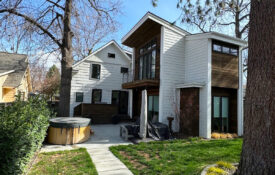Yesterday, to my dismay, the Seattle city council tightened rules on micro-apartments, the neo-rooming houses I lauded last year in Unlocking Home. The council, facing its first ever round of district-by-district elections next year, appears spooked by the complaints of some noisy (but not necessarily numerous) neighbors who have exclusionary attitudes. It imposed new restrictions including a requirement for two sinks in each unit (because… um… why?), design review for some micro-apartment buildings (just like the city requires for single-family houses of a similar size—oh, it doesn’t? Ok, well, because… reasons), and nearly doubled minimum floor area in some micros (because obviously the old minimum, which was about the size of a dorm room at Harvard or Stanford and was substantially more indoor space than most people now or ever before in the world have had to themselves, was a grave threat to health and livability -snark-). The new rules are perfect illustrations of the kind of banal-sounding land-use standards that have over decades pinched off much of the historic bottom end of the private housing market in the Northwest.
The rules will likely prevent construction of hundreds of inexpensive living spaces in Seattle’s most walkable neighborhoods over the next decade. It could even halt hundreds a year. I don’t have a full tally of all the subsidized affordable housing units built annually in the city, but I suspect it’s on the same order of magnitude. (Readers: can someone tell us?) The new rules are unlikely to completely squelch neo-rooming houses, but any reduction is too big a reduction. Cascadia’s largest city ought to be building housing of all types to accommodate the waves of newcomers who are already moving Northwest-ward (and possibly to prepare for the expected onslaught of climate migrants).
The entire exercise in clamping down on micro-housing was a discouraging display of pandering to the NIMBY forces that so often dominate local planning. It gets frustrating. As I wrote a year ago in the Seattle Times,
SEATTLE should stop lying to itself about affordable housing. For all our high-minded rhetoric about creating an affordable city, and for all our housing levies, the grim reality of city rules suggests that we actually want to stamp out affordable housing, not build it.
Are northwesterners who support green, affordable housing in for more frustration and disappointment in the months ahead? Let’s hope not. Seattle Mayor Ed Murray has launched a task force on housing affordability. Last week, I taped a brief segment on KUOW about it, arguing that a fundamental driver of high housing prices is that so much urban land in Northwest cities is reserved for single-family houses. (It was the point that Jerrell made late last month.)
Also yesterday, I had the chance to speak at the Housing Washington conference in Tacoma, on how cities can decriminalize inexpensive housing in order to complement subsidized affordable housing strategies. (Afterward, a local leader from Yakima told the story of trying to build a homeless shelter. He said that the city council won’t let him build it downtown; instead, the city of Yakima is telling him he must put it in a warehouse district. Literally warehousing the poor. Ouch.)
One questioner at the conference asked what political coalition might be mobilized to support legalizing inexpensive housing. I’ve been thinking about that question since.
The question reminds me of an essay that urban aficionado David Sucher wrote in 1998, when then-mayor Paul Schell organized a summit on housing affordability. Sucher wrote “Who really wants Affordable Housing? In terms of politics, basically no one.” Homeowners, mortgage lenders, investors, realtors, builders, property-tax-dependent governments, neighborhood associations: they all want housing prices to just keep rising, Sucher argued. He’s got a point.
Until we develop a power bloc—not just a righteous band of urbanists, sustainability wonks, real-estate developers, and advocates for low-income workers—I’m afraid elected leaders will keep getting spooked by NIMBYs.
The local power blocs that have a big financial stake in housing affordability are renters and employers, and neither goes to bat to increase the supply of rental housing. For one thing, many renters hope to be owners some day and don’t much care to get political. For another, some incumbent renters just want to pull up the draw bridge behind them, by pushing for short-sighted policy solutions like rent control—which locks in rents for current tenants while undermining the incentive to build new units.
Employers ought to care because expensive rental housing makes it hard to attract and retain workers, but they typically spend their political capital on other issues. In the Seattle area, when Boeing and Microsoft wade into local politics, it’s usually to support public spending on transit and roads on which their employees can get to work. They do not send lobbyists to meet with city council members in support of liberalizing rooming house regulations or legalizing in-law apartments. True, Boeing and Microsoft don’t employ many people in the aPodment demographic, but other large employers do. The biggest employers in the neo-rooming house districts of Seattle—Capitol Hill and the University District—are hospitals and universities, and they employ huge numbers of low- and medium-wage workers. The employer power bloc was notably absent from the city council chambers when the micro-housing scrum was underway.
The housing task force is notably lacking in representatives of major employers. When a Stranger reporter asked recently if the number of real-estate developers on the panel was troubling, I wish I’d said, “I’m more concerned that no one from human resources at Safeway or Swedish Hospital is on the list.” Until we develop a power bloc—not just a righteous band of urbanists, sustainability wonks, real-estate developers, and advocates for low-income workers—I’m afraid elected leaders will keep getting spooked by NIMBYs.











Rob Harrison AIA
Thank you for this Alan!
Also notably absent from Mayor Murray’s task force on housing: Someone with expertise in ultra-low or net zero energy building, such as a representative from the Passive House community, or the International Living Futures Institute. If the task force is going to approach this holistically (in Mayor Murray’s famous integrated fashion) don’t you think we ought to be thinking a little bit about how the way new housing is made will integrate with our goal of carbon neutrality?
Stockholm Environment Institute’s Carbon Neutral Plan for Seattle assumes 80% of housing will be built or renovated to something like Passive House standards by 2050. (Roughly, a 90% reduction in heating and energy use over 2009 code.) That means a deep energy retrofit for 110,000 existing single family houses and 110,000 existing multi-family units–about 3,000 of each per year. Anything that is built to energy code today will have to be renovated again by 2050. How is that going to affect affordability? Where is the money for those renovations going to come from?
I’m counting on you Alan to bring up this issue as well.
RC
What about the planned teardown of 4 blocks of Yesler Terrace low income housing units so Vulcan can build market-rate apts {20% for just below market rate}. Voted in by City Council. Where’s the coverage and commentary?
Eric de Place
Spot on, Alan. Thanks for writing this.
I think there’s another feature of local politics that’s worth mentioning: access. There’s a huge swath of the city’s residents — low income people, parents and other types of caregivers, people working multiple jobs or lots of hours, etc — who tend to be under-represented in the mechanisms of political influence simply because they don’t have the time or resources to participate. I will bet anybody $100 that the neighborhood councils, self-appointed but unofficial local planning groups, and people who show up to testify and lobby at City Hall are, on balance, considerably older, whiter, and wealthier than the city at large.
Not surprisingly, then, City zoning tends to reflect the preferences of the politically active. As you note, David Sucher has brilliantly argued that these people are actually antagonistic to affordable housing. (I think Sucher over-stated the dynamic though: lots and lots of people want affordable housing, it’s just that they tend to be the people who don’t have the time or resources to play in local politics.)
Final thought. I wish that everyone who lobbies to restrict housing choice would have to identify their own status. Do they own their own home? Are they a landlord? Because if you own your home — and certainly if you are a landlord — your basic economic interest is that property values and rents to go UP, not down.
RDPence
Why two sinks? Are you serious? You want to do your business in the bathroom, then grab the doorknob to open the door and go wash your hands in the sink where you prepare food and wash dishes? No Yuk factor working for you today?
Chris Troth
A few points about that:
1 – First world problem; many people around the world would love to have even one sink for themselves or their family.
2 – in terms of the apodment question, the situation is frequently individual rooms with a shared kitchen, so really no need for two sinks in the living/sleeping unit.
3 – Historic perspective – SRO’s not infrequently involved shared bathrooms as well as shared kitchens, as do many college dorms to this day. Sometimes the individual rooms would have private sinks, but not always. Civilization survived.
4 – IMHO, let the market take care of this – i.e., if you don’t like the situation, don’t rent. People can and will differ about this, but an official mandate for extra, unnecessary amenities only serves to drive up prices and reduce affordability.
Alan Durning
No doubt it’s nice to have two sinks. It’s also nice, for self-care and sanitation, to have both a shower and a bath. And a bidet, for that matter.
Neo-rooming houses do not have kitchens. The only in-room cooking tool is typically a microwave. The code says if you have a toilet, you must have a sink nearby. For basic housing without full cooking facilities, a single sink is adequate.
Anne Whitacre
Forty years ago when I was in college, I lived in a studio apartment in a building that had been converted from early 20th century hotel rooms. It had one sink — in the bathroom — and a dual-burner hotplate, and 3/4 size refrigerator. And maybe that was fine — as a student. It was clearly temporary, and also clearly not optimal.
You can cook entire meals in microwaves, and no matter what you might think ideally, that will involve some meal clean up. “One sink” may be a “first world problem”, but the reality is that we’re living in the first world and have expectations of cleanliness that we really don’t want to see go backwards. An inexpensive kitchen sink is $35, a faucet another $35 and if you add in the installation cost, maybe you’re up to $150. This is really not the place you want to save money.
Car-Free Lady
I live in Shared Housing with eight housemates in Tacoma. But, last month the property owner put this Shared House up for sale; so in the near future we will all be looking for low-income housing again…
Today, I was thinking that if I were a philanthropist with lots of money, I would start building and/or investing in low-income housing for minimum-wage workers, like me, who want to maintain their dignity and self-sufficiency without having to resort to government bailouts/handouts.
Reader
It’s about having location, location, location without needing to give up your economic freedom. Who wants/needs location and economic freedom, and doesn’t mind compact living quarters? Students and recent graduates, for two. Who else?
Reader
The “government handouts” issue is important, and I haven’t seen it addressed anywhere. Economic freedom via someone else subsidizing your living quarters doesn’t feel right, if you could choose a higher paying job.
Like C.F.L., I’d like to see more philanthropic activity in creating low-cost housing, housing that nonprofits’ staff could afford.
C-FL
You could also include people hit by The Great Recession and/or divorce and who want to start over without a lot of baggage…
Dick Burkhart
You are right, Alan, about many neighborhood groups, who were strong supporters of the new city council districts for the kinds of reasons you cite. I’m on the City Neighborhood Council, which has no one who represents renters, even though it is authorized to add representatives for the city’s “diverse population”, which includes economic status. In fact the CNC has lost credibility with the city council and others in city government for this and other reasons. I’m trying to interest the city council in taking a hard look at this situation.
Bryn Davidson
One thing is for sure, if Vancouver planning policy had been dependent on a district system then there would probably be no lane house policy, we’d have no business, and there would be 2000+ units of small housing 500 to 1000sf that wouldn’t exist.
Sarajane Siegfriedt
Your thesis is inaccurate. The City Council and DPD overwhelmingly represent developers. All the members of the Design Review Boards are development professionals, even the “community representatives.” Neighborhood interests are ignored, over and over. The recently published accounting of about half a billion dollars spend on infrastructure for South Lake Union proves the point. District 5, the Land Where the Sidewalks End, is still waiting for its share. More than anything else, this is the reason district elections passed. The fact that homeowners finally caught the attention of the Council is because of impending district elections.
You write that the Council required “…design review for some micro-apartment buildings (just like the city requires for single-family houses of a similar size—oh, it doesn’t? Ok, well, because… reasons).” However, there are no 5-story single-family homes with 48 residents and fewer than 1:1 parking spaces, so your analogy fails.
Jesse
I’d love for the idea of homeownership to shift from individuals (or legal super-individual,s AKA married couples) owning one lot, to more cooperative/condominium ownership.
There is little reason that people couldn’t be paying “rent” that is actually their portion of the mortgage nowadays. The means to automate knowing one’s share of property is here now.
As someone who lives in shared housing with 6 other people, I’m tired of dumping my money into someone else’s wealth.
Unfortunately, Washington’s Department of Securities and its divisions are unfriendly to such “risky” endeavors for anyone other than “accredited investors” making over $70,000/year or with ridiculous amounts of liquid assets.
I can’t even lend $25 to someone through a lending platform.
Affordable housing requires rethinking many more areas of our government than first meet the eye.
Christin
From what I’ve read (which admittedly is not that much as legal writing often makes my scientifically-focused brain hurt), a limited equity housing cooperative combined with a community land trust is a way for a small group of people to invest in multifamily housing to live in and offer shares to others. This way the tenants are the owners of the building(s) so the rent they pay each month is really just their share of the mortgage/taxes/upkeep. They agree to a cap in the amount of equity they can build per year on their share (which is usually tied to inflation so that you ultimately aren’t losing money if you later decide to move).
More info: http://coopnetwork.net/home/faqs
The point that you make about how many areas of government need to be rethought is very accurate.
I think we need to systematically reevaluate all ordinances/codes (heck, laws!) to determine whether or not each one necessitates waste or inefficiencies (and remove them if they do). It would also be beneficial if during this process we were forced to justify the existence of each ordinance, that way if the reason for the initial creation of an ordinance changes, we can efficiently change or delete the ordinance instead of having outdated and inefficient ordinances pile up on each other making building excessively complicated and costly.
This reevaluation process is key to developing low carbon infrastructure which is also affordable. Otherwise, we limit our opportunities to adapt older buildings to low-carbon and we limit access to low-carbon living.
For example, installing a homemade compost toilet in your own home can cost as little as $5 (+ some labor), whereas the cheapest manufactured composting toilets are upwards of $900. If the composted humus product conforms to safety measures as outlined by the EPA, why should a homeowner be forced to connect to local sewer lines (minimum of $800) which dump raw sewage into local water ways (otherwise known as combined sewer overflows, which are a reality in Spokane) rather than constructing their own composting toilet and using the product on-site? That is the current state of many regulations concerning composting toilets and human waste. .
Obviously this key is difficult to implement because our entire social structure is based on building upon what the last guy did, without reevaluating first. Many of the problems we are facing now are because the decisions the last guy made were not made with the information we have today and those decisions are no longer reasonable but there isn’t a useful mechanism for removing these unreasonable laws/codes/ordinances which were based on uninformed assumptions.
If our goals for our government are to keep people safe and keep them from destroying their (and their neighbor’s) future access to resources, then many of the current laws are in direct opposition to these goals.
This indicates a change is necessary in the method by which we organize ourselves and make decisions. Such as: using the best available research and understanding that new evidence means re-evaluation is necessary.
bill bradburd
Obfuscation on the matter really helps support the rhetoric.
“It imposed new restrictions including a requirement for two sinks in each unit (because… um… why?)”
–> because the Building Code requires it for apartments. Congregate projects (SROs) will not require two – or even one if there is a shared bathroom (like those Stanford dorms).
“design review for some micro-apartment buildings (just like the city requires for single-family houses of a similar size—oh, it doesn’t? Ok, well, because… reasons)
–> because the Land Use code calls for multi-family housing of that size to go through design review. It has nothing to do with single family homes. The reason for design review of course is that developers historically produced crappy infill (one of the prime instigators back in the day was Jim Potter, who is coincidentally the locus of almost all microhousing)
“and nearly doubled minimum floor area in some micros (because obviously the old minimum, which was about the size of a dorm room at Harvard or Stanford and was substantially more indoor space than most people now or ever before in the world have had to themselves, was a grave threat to health and livability -snark-)”
–> again, the Building Code requirement for small apartments is two sinks. SROs however will allow rooms as small as 70 sq ft without cooking or bathroom amenities in the unit (which should please Mr Durning immensely).
“The new rules are perfect illustrations of the kind of banal-sounding land-use standards that have over decades pinched off much of the historic bottom end of the private housing market in the Northwest”
–> the new rules reinforce the Building Code, and additionally have re-introduced the SRO which historically was the workhorse of affordable housing for transient and low-income residents but had been outlawed from the land use code for a couple of decades. The so-called “noisy (but not necessarily numerous) neighbors” called for SROs to be re-authorized as part of O’Brien’s stakeholders meetings (and in fact had done so for almost a year before that).
Of course Mr Durning spins a yarn about who doesn’t want affordable housing and continues to point a finger back at Seattle’s residents by loosely referring to David Sucher’s 1998 article. That article advocated for increased ownership (not rentals such as micro-units) because “home-ownership promotes social stability” and suggests that what would encourage greater home ownership in the multi-family zones was quality of life (“The challenge is to propel local government to create public environments which can compete in quality of life with what one finds in single-family blocks”). However it was how micro-housing DETRACTED from that quality of life in the lowrise zones (garbage receptacles on the sidewalk, lack of bike and auto parking, poor street appeal) that most neighbors objected to. Not the “exclusionary” rhetoric espoused by Durning and others. So the reading of Sucher would arguably SUPPORT the refined regulations.
Of course, reality doesn’t always jive with the contrived narrative of Mr Durning. And if there’s any pandering, it is Mr Durning’s derogatory slandering of Seattle residents and Council members who (despite his narrative) DO care about affordable housing. I have yet to find many homeowners that wouldn’t want to see ADU rules loosened or don’t see such gentle infill as desirable. And it was a citywide alliance of neighbors (not just a “few”) that recommended firming up the standards for small apartments (SEDUs) in lowrise zones, thereby allowing almost 4 to 1 increase in previous density limits for apartments, as well as asked for the aforementioned SROs.
One last point about the use of Sucher to bolster Mr Durning’s contrived argument. Sucher very well aligns his argument with that of Logan and Molotch in their seminal economic analysis of urban development, “Urban Fortunes”. In it they argue that the struggle is between residents concerned about “place” or “use” value (i.e. quality of life) and those interested in increasing “exchange” value of land (banks, investors, construction trades, and developers (and the associated architects, engineers and other secondary beneficiaries, such as lobbyists)). Sadly, the latter really do not want to produce lower cost housing or we would have seen lower rents in the micros than the just-under market price they are going for.
Mr Durning and all of us interested in producing affordable housing need to find ways to break the grip of the real local “power block” (Molotch’s “growth coalition”) and work with Seattle residents to find ways to add infill units allowing for home-ownership AND quality rental stock in a more thoughtful manner than the ham-fisted manner in which micro-housing was.
We should recognize the role of the City is to mediate between those interested in “place” and those interested in “profit”. And that as we plan for the next 20 years of growth, consideration of neighborhood interests should carry as much weight as what merely pencils for a developer.
Political consensus can be achieved by including the extant residents in the conversation. This worked for the prior 20 years via neighborhood planning and public discourse. Name calling and marginalizing will have the opposite effect.
Finally, I agree that employers, such as Amazon, should be at the table. And in fact they should be held accountable for part of our housing crisis. Their explosive growth, and the importing of workers to do that (rather than hiring from existing residents) is a prime example of what even Jane Jacobs would likely call bad urbanism (c.f. import substitution) and has resulted in this undue pressure on our housing stock. “Growth management” should address markedly imbalanced job growth relative to the housing stock or else we will continue to displace current residents and/or encourage sprawl in order to house these workers. Job and housing growth should move in tandem.
bill bradburd
typo, on minimum floor area:
–> again, the Building Code has a floor area requirement for small apartments. SROs however will allow rooms as small as 70 sq ft without cooking or bathroom amenities in the unit (which should please Mr Durning immensely)
Christin
I believe the main point Mr. Durning is trying to tease out is: that reinforcing the building code which is based on arbitrarily determined values to apply to micro-housing negates what the entire small (tiny) house movement is attempting to do.
It’s good that Seattle is acknowledging that people want to live in micro-homes. It’s bad that it’s limiting access to micro-homes even more, without legitimate reason.
Requiring two sinks because the building code requires apartments to have two sinks is far from EVIDENCE that two sinks are NECESSARY for the safety and comfort of tenants.
Requiring that each room is a minimum of 70 ft^2 because the that’s what the building code specifies without EVIDENCE that 70 ft^2 is NECESSARY for the safety and comfort of tenants reinforces the current barriers to micro-housing ( http://thetinylife.com/top-5-biggest-barriers-to-the-tiny-house-movement/ ). Barriers which shouldn’t exist since tiny homes have been around longer than building codes have existed.
These new rules will likely be the basis (if not apply directly) to single family homes which are built on the micro-housing scale and arbitrarily assigning rules which limit options for creative sustainable solutions for homeowners is in opposition to Sightline’s goal of a sustainable Northwest.
Most of these rules still make the tiny houses which have been safely (and discreetly) inhabited by residents for decades illegal because many of them are 70 ft^2 or less including bathroom and kitchen areas.
Questions about your specific comments:
“That article advocated for increased ownership (not rentals such as micro-units)…”
How does ownership exclude micro-housing? A higher percentage of tiny house people own their homes when compared to traditional homeowners. http://thetinylife.com/tiny-house-infographic/
If “micro-unit” was to imply that the comment refers only to multifamily properties, then please note that Limited Equity Housing Cooperatives exist and will probably become more prolific in the following decades. Ignoring the existence of this newer/lesser-known form of rental housing is convenient for your argument, but ultimately limits it’s applicability in reality.
“However it was how micro-housing DETRACTED from that quality of life in the lowrise zones (garbage receptacles on the sidewalk, lack of bike and auto parking, poor street appeal) that most neighbors objected to.”
Where did this information come from? What micro-housing project and neighborhood is it referring to? Where did you read the details on how micro-housing detracts from quality of life? (Are you saying that these were the objections brought up to the city council before they made their latest decision? If so, how did the decisions to establish larger room size and an additional sink address the concerns of parking, garbage receptacles, and street appeal?)
“And if there’s any pandering, it is Mr Durning’s derogatory slandering of Seattle residents and Council members who (despite his narrative) DO care about affordable housing.”
I didn’t think Mr. Durning’s point to bringing up the Sucher article was that the council and Seattle residents don’t care about affordable housing. I think the point is that they care MORE about their own interests than they care about accessibility to affordable housing. He’s not placing blame on these individuals for acting this way, it’s to their advantage to do so, and so it makes sense that they do. He’s pointing out that because of this conflict of interest, these people shouldn’t comprise the majority of voices who are discussing the goal of accessible and affordable housing, because ultimately, that’s not really their goal. (Eric de Place echoes and expands on this in the first few comments.)
“…add infill units allowing for home-ownership AND quality rental stock…”
Just wanted to point out again that due to Community Land Trusts and Limited Equity Housing Cooperatives viewing housing as a rent versus own situation is quite limiting since LEHCs offer an effective way for renters to become owners.
“…in a more thoughtful manner than the ham-fisted manner in which micro-housing was.”
When you refer to micro-housing, are you referring solely to Seattle’s latest attempt of implementation? If so, perhaps you are unaware of an entire movement (small house movement, aka tiny house movement, micro-house movement) which began at the beginning of the 20th century and gained a bit of momentum in the 1970s and again in the later 2000s, but has been, until now, ultimately ignored by local policy-makers?
(Mr. Durning: Please correct (and forgive) any faulty assumptions I’ve made on your behalf. I attempted to address Bill’s concerns with my interpretation of your above article.)
bill bradburd
Seattle’s Building Code is NOT based on “arbitrarily determined values”, but is based on the State’s Building Code, which is by RCW is the International Building Code.
That is where standards for habitability come from (including room size, ventilation, sanitation, safety egress, etc). The IBC is set by a whole system of industry professionals and reviewers and has in its commentary some of the rationale for things such as room size and sanitation. I think you will find there is a lot of research into consequences of room size, and other habitability factors.
You suggest that I defend the Building Code which is defined by a field of experts, including those that build housing. It seems more to the point that those wishing to diminish those standards, such as Mr Durning and Mr Valdez, provide the evidence that such diminishment makes sense and is of no consequence, and then put forward this request for change through the official process. Anecdotal evidence of someone renting substandard housing doesn’t necessarily lead to the conclusion that the standards should be lowered (http://www.deathandtaxesmag.com/226905/landlord-fined-for-renting-apartment-that-could-only-be-entered-by-crawling/).
I think that your references to tiny “houses” is conflated with the rental market for “Pod”-type housing. There has never been any indication that mircos were a home ownership option. I suspect there is little interest in people wanting to “own” a 150sqft micro (or even the now mandatory 220 sqft, 2 sink version), but I am open hearing otherwise. It has been clear that the developers of these units were seeking short term rentals (leases are month to month) and even Potter has said he wanted a piece of the hotel-night action provided by Amazon and other tech firms.
That said, I am a strong supporter of expanding backyard cottage homes in single family and lowrise zones, and the Seattle Council’s current efforts to find ways to make such development easier. The tiny homes movement can well-inform that process.
We have a great opportunity to use the “cottage” housing type more frequently, but land values priced for larger home options perhaps make that impossible. Our land use code allows townhouses and cottages alike in the lower-density lowrise zones, so the higher priced option will always be taken and land values will reflect that.
We should have fixed these anomalies in the lowrise rewrite in 2010. Instead we allow lower density townhouses in LR3 (certainly more profitable for developers, but not achieving density goals that we could with say apartments), and larger townhouses in LR1 (where “tiny house” cottages could go) thereby making land prices too high to support cottages there.
I personally am in favor of alternative methods of ownership and financing for housing such as CLT and LEHC. I know people that have bought into co-housing situations and the likelihood that a tiny-apartment variant could arise wouldn’t surprise me. But I suspect that the vast majority of this will remain as rental housing stock. And I am very much in favor of helping the non-profits get into the SRO game to provide much needed housing at the 50% AMI and below. Micros at $1350/month are not satisfying that need. And of course the new legislation allows for-profit developers to produce SRO type housing of a higher quality, as folks like David Nieman in Seattle and developers in other cities are doing.
The complaints about impacts of the unregulated micros in the neighborhoods are well documented and tied to the issue of miscounting units to avoid SEPA and Design Review (where issues like garbage receptacle placement, street appeal and parking are addressed). This has been well documented for years and how most people have been made aware of the problem in the first place.
The room size and sink issues (along with fire safety and egress) became better known as people (including Council) became more aware of what was happening IN the buildings. It became clear that the projects were specifically NOT putting in the second sink to avoid the unit being counted as a “dwelling unit”, or were using a single kitchen through which units exited in conflict with egress requirements for apartments.
Christin, I am quite aware of the national trends toward smaller unit size and have been following the micros issue for a couple of years. Personally, I lobbied council in 2010 to lift density limits that would allow smaller apartments in lowrise zones (in exchange for long term affordability of the additional units). Council instead went with the Master Builders proposal to “Build Green” for the lift of limits (however I feel that ALL lowrise infill should be Built Green to help meet our sustainability goals). So we have now micros that are priced per unit at just-below market rate of studios (at a far greater per sq ft cost for the tenant) instead of lower cost as they could be.